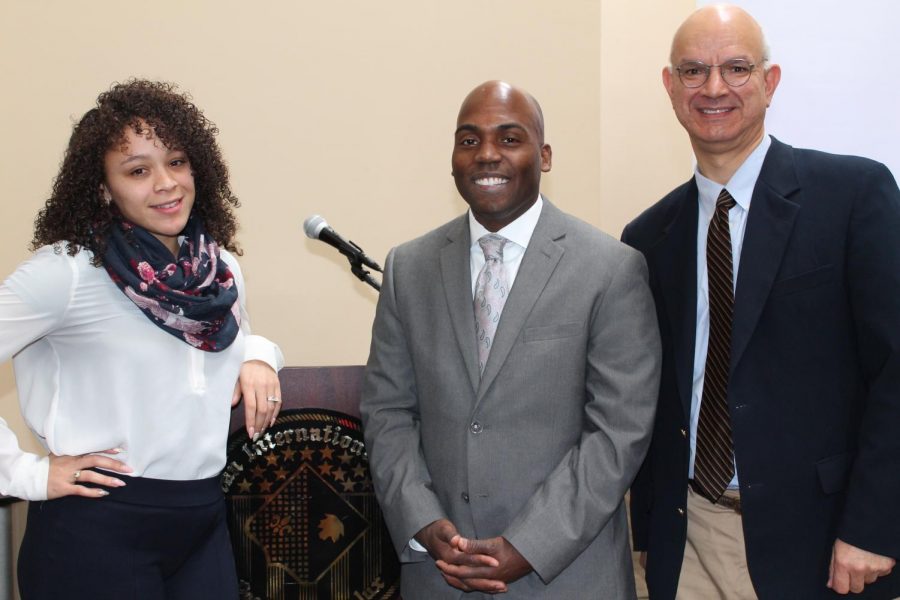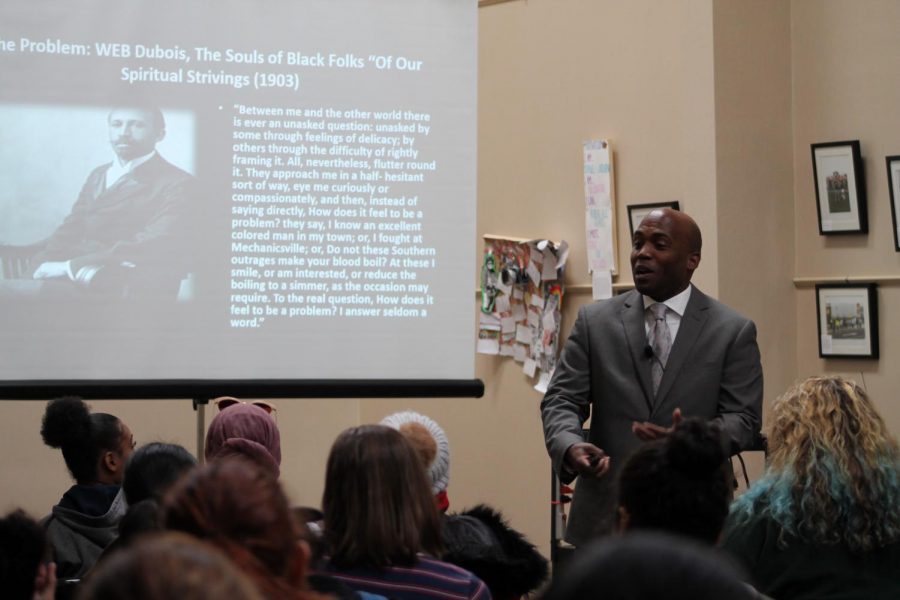Finding the strength to love, with Dr. Yohuru Williams (STORY/PHOTOS)
L-R: Alicia McKenzie (AIC’s Assistant Director of Diversity Education), Dr. Yohuru Williams, Professor Gary Jones (Professor of History at AIC)
January 28, 2018
(Photos by Samria Abdul-Karim)
On January 25, Dr. Yohuru Williams captured the audience in the West Wing at AIC as he flipped through a slideshow of satirical cartoons and quotes from famous revolutionaries through history.
The packed audience sat attentively to this commanding, lively and fact-filled presentation based on Martin Luther King Junior’s second book, ‘Strength to Love,’ published in 1963.
The now Dean of the College of Arts and Sciences at the University of St. Thomas joined AIC for a second time a week after Dr. Martin Luther King Jr. Day in a presentation entitled ‘Finding the Strength to Love Dr. King’s Message of Creative Maladjustment Then and Now.’
In his first visit last year, Dr. Williams stressed the importance of students becoming “the giants” or heroes of their own stories to create change for the future.
After the one-year anniversary of President Donald Trump’s inauguration, Dr. Williams reiterated that same message by highlighting passages from “’Strength to Love,’ written by the late Dr. King.
Williams said that people often get caught up in what they think is realistic or reasonable when demanding justice or equality, when leaders in the civil rights movements and the students who were heavily involved in that movement didn’t have “realistic hope” in driving the Civil Rights Movement as they did.
“The things that Dr. King talked about in this book, because of the historical moment he found himself in when he wrote it in 1958, apply to us today,” Williams said.
“In a lot of ways, our contemporary situation greatly resembles that moment from 1958… when there was no reasonable expectation that they were going to topple segregation. It was the audacity of hope,” he added.
Kei’Shairra Jackson, a sophomore and a member of the student organization PLUS, said that much of what Dr. Williams had spoken about in his talk had inspired her to implement his message within her community and her organization.
“I am very opinionated, so I know that if I speak out, at least one person will hear me, and that’s what’s important,” said Jackson.
“Educating even one person on the intersectionality of people’s struggles within the trans community, the black community, between women and feminists, is very important and the speaker made that very clear. It all connects and seeing how powerful people’s fight for equality in the past was and how it directly relates to what we are saying now shocked me,” she added.
Alicia McKenzie, the Assistant Director of Diversity Education at AIC, was also impressed with the speaker’s message of learning from history in order to create a better future.
“College helps you to be a more engaged citizen so that when you go out and leave here, you’re more conscious, not just about yourself but about the struggles of other people around the world,” McKenzie said.
She continued to say that the message that resonated with her the most was that you have to be dedicated to your cause to effect change.
“You have to be willing to put everything on the line to create real change. You often find yourself teetering between ‘Should I or shouldn’t I?’ and that is an internal struggle for a lot of people. Because of my passion, my role, and because of my responsibility to my students, I feel like that was the push I needed to take that leap for what is right, regardless of the barriers,” she said.
Dr. Williams went on to say that there are many ways in which people can be involved in a movement; that it is not limited to taking to the streets.
He listed literature from authors across the nation and from all different time periods that wrote books as their ways to help the causes that they believed. He also emphasized the different styles of protests from Mohammad Ali, Collin Kaepernick, to the black students who years ago protested segregation by simply sitting at a diner counter where they knew they were not welcome.
“Who decided that the only way we could protest was marches? We are not fixed into a predetermined way to express yourself or to think about the ways we challenge each other,” Dr. Williams stated. “And don’t just tweet a picture of yourself at the women’s march with a pink hat on. It requires us to be vigilant in a way that requires action.
“I have to tell the truth, otherwise I wouldn’t be true to myself. That’s why you get an education, and that’s the responsibility that comes along with it.”
The event was sponsored by AIC’s Cultural Affairs Committee, the Honors Program, and the Office of Student Engagement.




